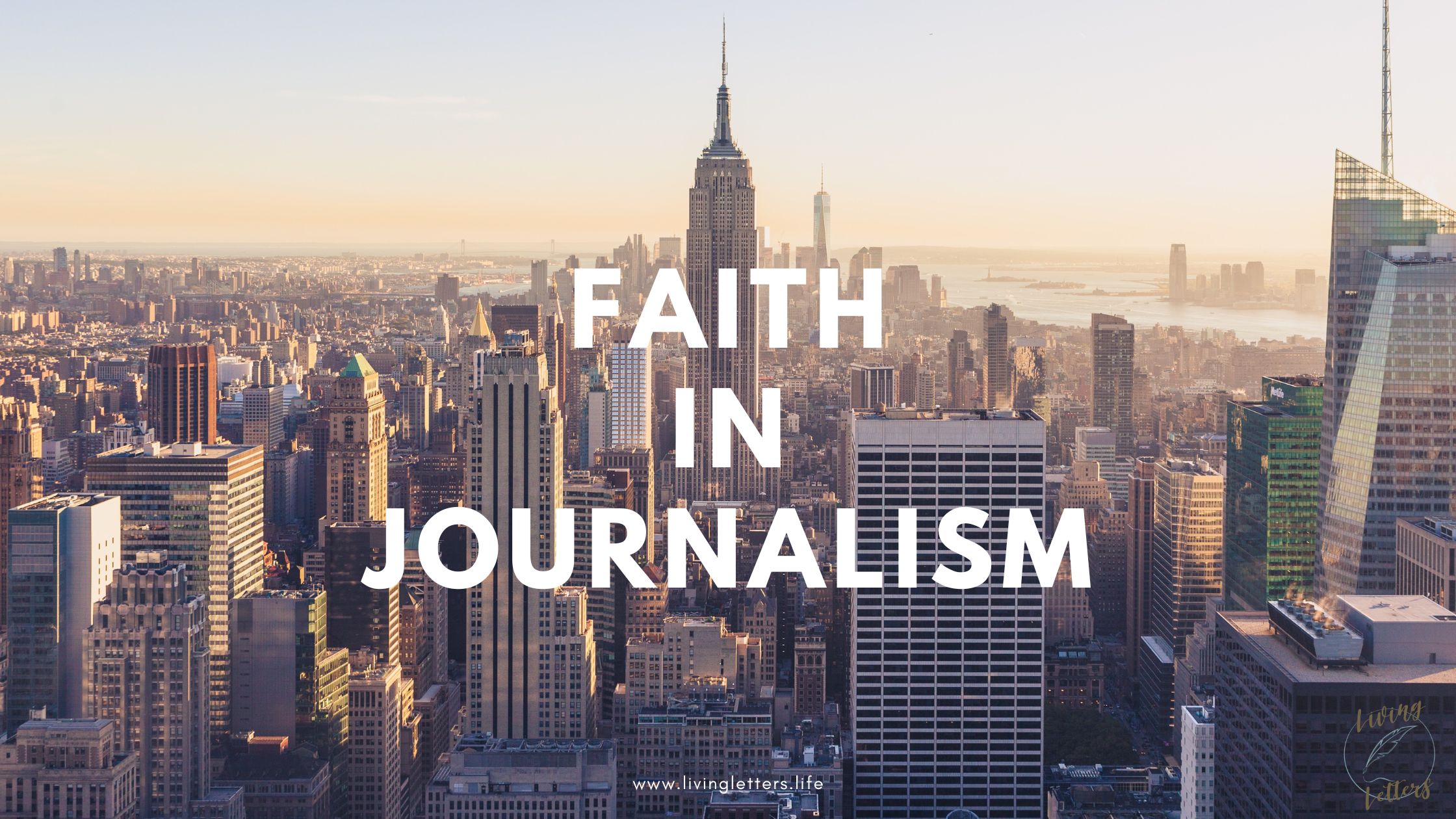
I always appreciate Jordan Smith's willingness to write a column for our readers. You may remember that I first met Jordan when she was a Freshman at Liberty University pursuing studies in journalism. This month she writes about being a Christian journalist for a Casper, Wyoming newspaper.
I well remember my own experiences from 50 years ago after I graduated with a degree in journalism and moved to New York City for my first job. Several family members and fellow Christians felt like any kind of secular news reporting would be a mistake—like working for the devil. Ultimately that was not the area God led me into but my love for journalism and good reporting has never diminished.
Recently, World Magazine, interviewed long time Christian journalist, Cal Thomas. His remarks are right in line with what Jordan writes below: “Objectivity is impossible since we all have worldviews. Fairness is another matter, and it means reporting what one sees without an agenda or beginning with a narrative and then looking for information that fits that narrative.”
Thomas continues: “As for being a believer and succeeding in this business, I think you have to read everything others read and know what they know….I tell aspiring journalists to get in the door, have a servant spirit, and let their light shine through….Be good at your craft and you will gain respect, if not always acceptance of your beliefs” (World, June 3, 2023, “A Chat with Cal Thomas” p. 72).
I'm glad I can share with you Jordan's thoughts which echo Thomas' statements above.
Last summer, soon after I moved to Wyoming, I got new license plates for my car. This was not only required by law, but exciting, as I could hang up my Pennsylvania plate in my apartment as a reminder of where I come from.
I had just one small problem: I could not, for the life of me, get my old plate off. It had been screwed on somewhat hastily, my dad admitted to me over a FaceTime call, during which I tried with all my might to remove it.
So I texted a new friend, a lovely, Christlike woman that I trusted would know someone who could help me. She responded almost immediately. A man at her church would be more than willing to help, she said, and she gave me his address. Great guy, she told me. A believer.
Perfect. I went over to his house and within minutes, he had successfully removed any trace of Pennsylvania from my car. As he did so, he asked me where I worked.
“The Casper Star-Tribune,” I told him.
He responded with something along the lines of, “Oh, you're gonna try to improve it, huh? We call it the Casper Fishwrapper, because that's about all it's good for.”
I still struggle to make sense of what he said. Why would he say that when we knew next to nothing about each other. His remark stung. This man is a Christian, I thought. That wasn't kind, and it implied something about my character that is untrue. Plus, I would never make a comment like that to him about his job, even if I didn't agree with it.
“ “Good ones” does not mean hardworking, ethical, fair or committed to the truth and exposing injustice. It means that I must agree with their political stances. ”
I soon came to learn that reactions like his would be common when I spoke about my workplace to people in the community, but especially among Christians. It's not rare that I get a “Oh, you're one of the good ones, right?” when I tell them I'm a reporter. Of course, “good ones” does not mean hardworking, ethical, fair or committed to the truth and exposing injustice. It means that I must agree with their political stances.
In this post, I want to discuss the implications of being a Christian journalist working at a secular news organization and why believers must understand that faith and journalism can coexist – can even go hand-in-hand! Whether they mean to or not, I often feel that the Christians I interact with doubt my faith when I say that I am first a follower of Christ and second, a journalist.
To be clear, this is not to promote journalists as flawless or incapable of making mistakes. This is not to promote blindly reading the news without any critical thinking or personal fact-checking. This is not to promote a secular worldview over a biblical one.
However, it is important to realize that everyone has a bias. Me, you, your best friend's brother's ex-girlfriend from eighth grade. All of us. To be stripped of a bias, I'd have to be also stripped of my compassion and empathy. But the readers of the very news organizations and journalists who are so often accused of being biased must also realize that they, too, have an invisible lens that colors the way they interpret articles.
I'm not asking that we take off our biases. In fact, I don't think it would be Christlike to say that we must get rid of all of our worldviews. If we follow and love Christ, we (hopefully) are gaining more and more of a biblical worldview, growing in the wisdom and knowledge of God. I could never say with a clear conscience that we should try to remove that.
My point is that we should be aware that we all have biases to some degree and what they are.
Moreover, that same worldview should empower us to remember that journalists, like every human, are made in the image of God. The idea of a nameless, faceless “media” entity is demoralizing to the thousands of hardworking journalists who are dedicated to holding people in power accountable and bringing to light injustice and oppression. We're real people, too, trying to make ends meet and perform well in our careers.
Keeping those two things in mind, we can read coverage that we may well not agree with, and instead of immediately thinking derisively about the “media,” we can identify how we differ in opinion and thought from the story, its subjects and its writers and then pray for wisdom for them and ourselves.
“ ...Particular events are not ultimate. They are part of a bigger story of God accomplishing his will, and journalists can help Christians avoid panic even amid gloom. -Marvin Olasky ”
One of the more interesting biblical parallels that I recently thought of is the idea of the gospel writers as reporters. If a reporter is an eyewitness to an event and then gives a report back to those who were not there of what happened, then Matthew, Mark and John could all be classified as reporters.
Before I go too far into that, though, let me acknowledge that the gospel writers, or reporters, if you will, were writing the greatest story that is, ever was, and ever will be, and they were doing so as directed by God. That is an assignment that is far greater than anything I will ever get to do in this earthly life. But the more I thought about it, the more I thought that what they did made an interesting parallel to what I do: observe, note, report.
Marvin Olasky's 2019 book “Reforming Journalism” makes a wonderful and thorough argument for an objective, ethical and fair Christian presence in journalism – why believers should embrace news coverage with a keen eye rather than reject it completely. And he also makes arguments that the Bible is full of “trumpet-blowing” news headlines.
“The Gospels are news stories, not an instructional manual, and Luke almost two thousand years ago began his account by saying his purpose was to write an orderly history that would give us certainty concerning what we had heard. Luke knew and we know particular events are important because the world is important, but particular events are not ultimate. They are part of a bigger story of God accomplishing his will, and journalists can help Christians avoid panic even amid gloom” (“Reforming Journalism”, p. 16).
“ They're trying their best, even amidst a drive to squeeze local journalism as small as it can go, to tell the stories that matter to you. ”
Not to mention, even in an ever-shrinking local journalism landscape, communities rely on journalists to keep them updated and engaged in what's going on. These are the sources from which they know who's engaged, who's married, who's foreclosing, who died.
My father grew up in a very small town about an hour away from State College, Pennsylvania. It was not in Appalachia, but I would classify it as Appalachian-adjacent – a mountain town in which everyone knows everyone else and traditional values are clung to firmly. Even now, over 30 years since he moved away from the town, he reads the local newspaper often.
Your own community paper, whether you live in a tiny town or a large county, is trying their best to keep you informed. They're trying their best, even amidst a drive to squeeze local journalism as small as it can go, to tell the stories that matter to you. It may sound cliche or even advertorial, but I, along with many colleagues at local papers around the country, will attest to that.
“ I trust that it is His will that I'm here doing what I'm doing. And it's not a mistake that I'm part of His family, either. ”
I chose to do what I do for a number of reasons: I love to write, I like getting to talk to new and exciting people every day, I enjoy the license that comes with being a journalist. It's thrilling to be able to walk
up to someone and say, “My name is Jordan Smith and I write for the paper. Can I ask you a few questions?”
But I wouldn't be doing this if I hadn't fought long and hard to figure out what career God wanted me to pursue in high school. I trust that it is His will that I'm here doing what I'm doing. And it's not a mistake that I'm part of His family, either.
In fact, that gives me an eternal purpose to my work: I write the stories that He has ordained, and the greatest story that exists – the Gospel – is part of mine.


Send Me A Message